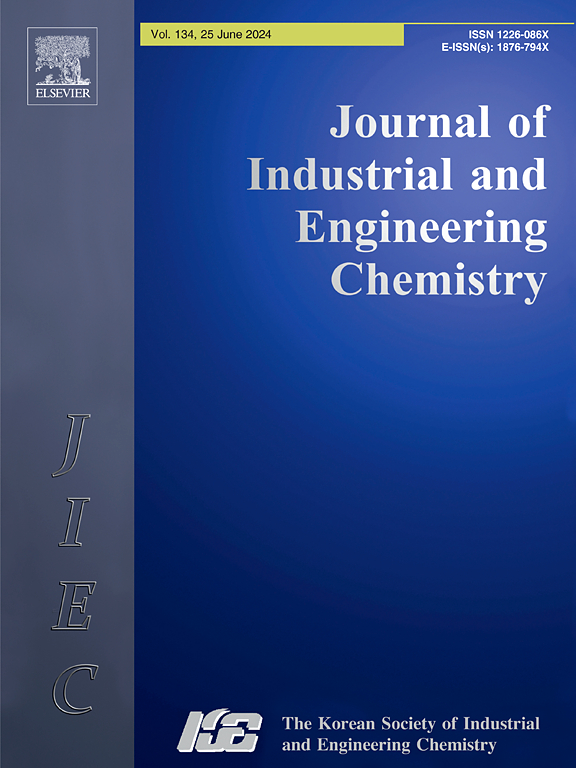Diffusive nature of different gases in graphite: Implications for gas separation membrane technology
IF 5.9
3区 工程技术
Q1 CHEMISTRY, MULTIDISCIPLINARY
Journal of Industrial and Engineering Chemistry
Pub Date : 2024-10-09
DOI:10.1016/j.jiec.2024.09.052
引用次数: 0
Abstract
Graphite membranes have gained attention in membrane technology for gas separation due to their high stiffness, strength, and stability in corrosive and high-temperature environments. Graphite exists naturally in geologic media and can also be prepared by synthetic processes. In- situ hydrogen (H2) production in petroleum reservoirs or H2 storage in depleted gas reservoirs results in contamination with CH4 and CO2. To address the separation challenge at the surface, a sustainable downhole wellbore membrane must be available to separate H2, leaving behind CO2 and other gases to improve operational economics. Currently, there are no studies in the literature on the self-diffusivity of gases (CO2, H2, and CH4) in graphite as a function of pore size. To overcome time constraints in diffusivity experiments, this work utilized mathematical models and molecular simulations to delineate the self-diffusivity of gases in graphite of different pore sizes.
To acknowledge subsurface operational conditions during in situ hydrogen production, we considered a temperature of 360 K and a wide pressure spectrum from 2 MPa to 21 MPa. In this study, we explored the diffusive nature of H2, CH4, and CO2 gases in different nanopore-sized graphite using analytical and molecular simulation approaches. We validated the results by presenting unrestricted case density calculations. First, effective diffusivity was calculated using the mean free pore path, followed by gas adsorption at high pressures (10–21 MPa) and a temperature of 350 K. The study utilized theoretical models and molecular dynamics (MD) simulations to determine the self-diffusivity of gases in graphite systems with various structures.

求助全文
约1分钟内获得全文
求助全文
来源期刊
CiteScore
10.40
自引率
6.60%
发文量
639
审稿时长
29 days
期刊介绍:
Journal of Industrial and Engineering Chemistry is published monthly in English by the Korean Society of Industrial and Engineering Chemistry. JIEC brings together multidisciplinary interests in one journal and is to disseminate information on all aspects of research and development in industrial and engineering chemistry. Contributions in the form of research articles, short communications, notes and reviews are considered for publication. The editors welcome original contributions that have not been and are not to be published elsewhere. Instruction to authors and a manuscript submissions form are printed at the end of each issue. Bulk reprints of individual articles can be ordered. This publication is partially supported by Korea Research Foundation and the Korean Federation of Science and Technology Societies.

 求助内容:
求助内容: 应助结果提醒方式:
应助结果提醒方式:


